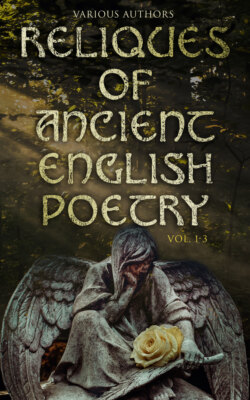Читать книгу Reliques of Ancient English Poetry (Vol. 1-3) - Various Authors - Страница 27
На сайте Литреса книга снята с продажи.
IN THE BATTLE OF OTTERBOURNE.
Оглавление[Ver. 101. Mentaye.] At the time of this battle the Earldom of Menteith was possessed by Robert Stewart, Earl of Fife, third son of K. Robert II., who, according to Buchanan, commanded the Scots that entered by Carlisle. But our minstrel had probably an eye to the family of Graham, who had this earldom when the ballad was written. See Douglas's Peerage of Scotland, 1764, fol.
[Ver. 103. Huntleye.] This shews this ballad was not composed before 1449; for in that year Alexander Lord of Gordon and Huntley, was created Earl of Huntley, by K. James II.
[Ver. 105. Bowghan.] The Earl of Buchan at that time was Alexander Stewart, fourth son of K. Robert II.
[Ver. 107. Jhonstone—Maxwell.] These two families of Johnstone Lord of Johnston, and Maxwell Lord of Maxwell, were always very powerful on the borders. Of the former family was Johnston Marquis of Annandale: of the latter was Maxwell Earl of Nithsdale. I cannot find that any chief of this family was named Sir Hugh; but Sir Herbert Maxwell was about this time much distinguished. (See Doug.) This might have been originally written Sir H. Maxwell, and by transcribers converted into Sir Hugh. So above, in No. I. v. 90. Richard is contracted into Ric.
[Ver. 109. Swintone.] i.e. The Laird of Swintone; a small village within the Scottish border, 3 miles from Norham. This family still subsists, and is very ancient.
[Ver. 111. Scotte.] The illustrious family of Scot, ancestors of the Duke of Buccleugh, always made a great figure on the borders. Sir Walter Scot was at the head of this family when the battle was fought; but his great-grandson, Sir David Scot, was the hero of that house when the ballad was written.
[Ibid. Stewarde.] The person here designed was probably Sir Walter Stewart, Lord of Dalswinton and Gairlies, who was eminent at that time. (See Doug.) From him is descended the present Earl of Galloway.
[Ver. 112. Agurstonne.] The seat of this family was sometimes subject to the kings of Scotland. Thus Richardus Haggerstoun, miles, is one of the Scottish knights who signed a treaty with the English in 1249, temp. Hen. III. (Nicholson, p. 2, note).—It was the fate of many parts of Northumberland often to change their masters, according as the Scottish or English arms prevailed.
[Ver. 129. Murrey.] The person here meant was probably Sir Charles Murray of Cockpoole, who flourished at that time, and was ancestor of the Murrays sometime Earls of Annandale. See Doug. Peerage.
[Ver. 139. Fitz-hughe.] Dugdale (in his Baron. v. i. p. 403) informs us that John, son of Henry Lord Fitzhugh, was killed at the battle of Otterbourne. This was a Northumberland family. Vid. Dugd. p. 403, col. 1, and Nicholson, pp. 33, 60.
[Ver. 141. Harbotle.] Harbottle is a village upon the river Coquet, about 10 m. west of Rothbury. The family of Harbottle was once considerable in Northumberland. (See Fuller, pp. 312, 313.) A daughter of Guischard Harbottle, Esq., married Sir Thomas Percy, Knt., son of Henry the fifth—and father of Thomas seventh, Earls of Northumberland.
